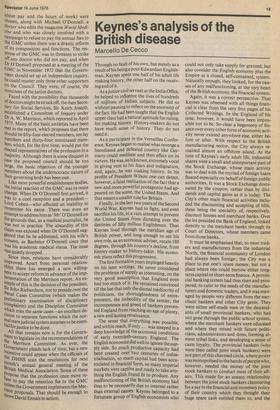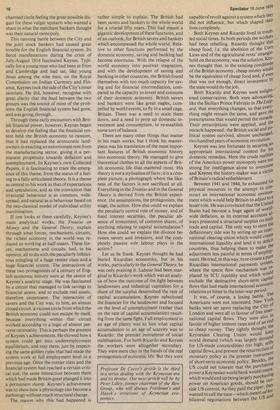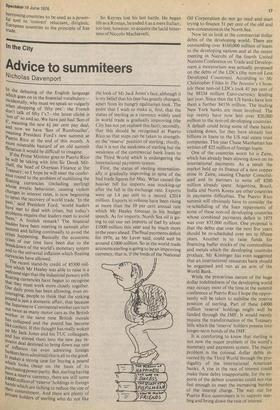Keynes's analysis of the British disease
Marcello De Cecco
Through no fault of his own, but merely as a result of his being a post-Edwardian English man, Keynes spent one half of his adult life making history, the other half on the receiving end of it. As a junior civil servant at the India Office, he helped to influence the lives of hundreds of millions of Indian subjects. He did so without pausing to reflect on the enormity of the fact. He had been taught that the English upper class had a natural aptitude for ruling, for making history. History-makers do not have much sense of history. They do not need it.
As a participant in the Versailles Conference, Keynes began to realise what revenge a humiliated and defeated country like Germany could meditate and then effect on its victors. He was, as is known, extremely vocal in giving vent to his fears and indignation, and, again, he was making history. In his profile of President Wilson one can detect, however, a faint realisation of the fact that a new and more powerful protagonist had appeared on the scene, the United States. And that meant a smaller role for Britain.
Finally, in the last two years of the Second World War, Keynes had to fight, and even sacrifice his life, in a vain attempt to prevent the United States from dictating over the destinies of fifty million Englishmen. Thus Keynes lived through the meridian age of British power, and long enough to see his own role, as an economic adviser, rotate 180 degrees, through his country's decline, from history-maker to history-taker. His economic plans reflect this progression.
The first formative years impinged heavily on his later writings. He never considered the problems of supply as interesting, on the very good assumption that England even had too much of it. He remained convinced till the last that only the dismal mediocrity of politicians, the shortsightedness of entrepreneurs, the imbecility of the rentier, the incompetence and greed of bankers prevented England from reaching an age of plenty, a new and lasting renaissance.
The sense that everything was possible, and within reach, if only. . was steeped in a deep knowledge of the economic conditions of early twentieth-century England. The English economist did well to ignore the supply side. So much productive capacity had been created over two centuries of industrialisation, so much capital had been accumulated in financial form, so many imperial markets were captive and ready to take anything the English found fit to produce. Any malfunctioning of the British economy had thus to be necessarily due to internal rather than external causes. Keynes belonged to a fortunate group of English economists who could not only take supply for granted, but also consider the English economy plus the Empire as a closed, self-contained, system. Naturally enough, they looked, for the causes of any malfunctioning, at the very heart of the British economy, the financial system.
Again, it was a correct perspective. That Keynes was obsessed with all things financial is clear from the very first pages of his Collected Writings. In the England of his time, however, it would have been impossible not to be. So clear a hegemony of finance over every other form of economic activity never existed anywhere else, either before or after. With respect to the British manufacturing sector, the City always remained almost an offshore island. At the time of Keynes's early adult life, industrial shares were a small and unimportant part of the Stock Exchange, whose main activity was to deal with the myriad of foreign loans floated especially on behalf of foreign public authorities. It was a Stock Exchange dominated by the coupon, rather than by dividends and capital gains as it is today. The City's other main financial activities included the discounting and accepting of bills, these being the speciality of, respectively, discount houses and merchant banks. Over the lot presided the Bank of England, linked directly to the merchant banks through its Court of Directors, whose members came from those banks.
It must be emphasised that, to most traders and manufacturers from the industrial North, the financial community of London had always been foreign; the City was a place to put one's spare money, but not a place where one could borrow either longterm capital or short-term finance. A provincial banking system had thus risen and prospered, to cater to the needs of the manufacturers and domestic traders, and it was managed by people very different from the mer chant bankers and other City gents. They were either self-made men or the descend ants of small provincial bankers, who had not gone through the public school system, where the merchant bankers were educated and where they mixed with future politi cians, administrators and dons, forming almost tribal links, and developing a sense of caste loyalty. The provincial bankers (who were then called joint stock bankers) were not part of this charmed circle, where power was monopolised in the hands of people who, however, needed the money of the joint stock bankers to conduct most of their aff airs. This made for an uneasy relationship between the joint stock bankers clamouring for a say in the financial and monetary policy of their country which they thought their huge spare cash entitled them to, and the charmed circle feeling the great possible disgust for these vulgar upstarts who wanted a share in what the merchant bankers thought was their natural monopoly.
This running battle between the City and the joint stock bankers had caused great trouble for the English financial system. Its fierce manifestations during the crisis of July-August 1914 fascinated Keynes. Typically for a young man who had been at Eton and Cambridge and had sat, like young Jesus among the wise men, on the Royal Commission on Indian Currency and Finance, Keynes took the side of the City's inner sanctum. He did, however, recognise with great clarity that the feud between the two groups was the source of most of the problems the English financial system had gone, and was going, through.
Through these early encounters with British financial power, however, Keynes began to develop the feeling that the financial system held the British economy to ransom, that it had replaced the aristocratic landowners in exacting an extortionate rent from the manufacturing sector, giving it a permanent propensity towards deflation and unemployment. In Keynes's own Collected Papers, it is fascinating to trace the emergence of this theme, from the status of a feeling to a fully articulated theory. It is a theme as central to his work as that of expectations and speculation, and as the conviction that irrational behaviour is as common, widespread, and natural as is behaviour based on the neo-classical model of individual utility maximisation.
If one looks at them carefully, Keynes's main analytical works, the Treatise on Money and the General Theory, explain through what forces, mechanisms, circuits, the richest economy in the world was reduced to working at half-steam. These forces. mechanisms and circuits, had, in his opinion, all to do with the peculiarly infelicitous mingling of a huge rentier class and a huge financial system. The interactions of these two protagonists of a century of English economic history were at the centre of Keynes's analytic stage. He was fascinated by a circuit that managed to link savings to financial assets, and to exclude real assets, therefore investment. The interaction of savers and the City was, to him, an almost closed circuit, a vicious circle from which the British economy could not escape by itself, because everything within that circuit worked according to a logic of almost perverse rationality. This is perhaps the greatest of Keynes's achievements. He showed how a system could get into underemployment equilibrium, and stay there, just by respecting the same golden rules that had made the system work at full employment level in a previous age. Once the rentier class and the
financial system had reached a certain critical size, the same interaction between them which had made Britain great plunged it into a permanent slump. Keynes's achievement was to show how a physiology can become a pathology without much structural change.
The reason why this had happened is rather simple to explain. The British had been savers and bankers to the whole world for a crucial fifty years. This had meant a gigantic development of these functions, and of an outlook, for British savers and bankers which encompassed the whole world. Relative to other functions performed by the domestic economy, saving and banking had become enormous. With the relapse of the world economy into postwar stagnation, and with the development of saving and banking in other countries, the British found themselves with too much capacity for saving and for financial intermediation, compared to the capacity to invest and consume of their domestic economy. British savers and bankers were like great eagles, compelled by world events, to fly in a small cage, Britain. There was a need to scale them down, and a need to prop up domestic investment and consumption, to re-establish some sort of balance.
There are many other things that matter in his main works, but I think his masterpiece was his translation of the most important features of British economic history into economic theory. He managed to give theoretical clothes to all the aspects of British economic life that mattered most. His theory is not a stylisation of facts; it is a complete picture, a photograph where the likeness of the factors is not sacrificed at all. Everything in the Treatise and in the General Theory is derived from the British experience: the assumptions, the protagonists, the stage, the action. How else could we explain the peculiarly central role of money, and of fixed interest securities, the peculiar absence of investment, of common shares, of anything relating to capital accumulation? How else could we explain the divorce between savers and investors, and the completely passive role labour plays in the action ?
Let us be frank. Keynes thought he had buried Ricardian economics, but in his works, particularly in the General Theory, he was only praising it. Labour had been marginal in Ricardo's work which was an analysis of how the outcome of the fight between landowners and industrial capitalists for a share of the surplus determined the rate of capital accumulation. Keynes substituted the financier for the landowner and focused on the level of unemployment (rather than on the rate of capital accumulation) resulting from the same fight. Full employment in an age of plenty was to him what capital accumulation in an age of scarcity was to Ricardo: the premier instrument of social stabilisation. For both Ricardo and Keynes the workers were altogether secondary. They were mere clay in the hands of the real protagonists of economic life. But they were
capable of revolt against a system which they did not influence, but which shaped their lives completely.
Both Keynes and Ricardo lived in troubled social times. In both periods the workers had been rebelling. Ricardo thought that cheap food, i.e. the abolition of the Corn Laws and of the agricultural rents' stranglehold on the economy, was the solution. Keynes thought that, in the existing conditions of the British economy, cheap money would be the equivalent of cheap food and, if even that was not enough, direct investment bY the state would do the job. Both Ricardo and Keynes were enlightened conservatives. Both were advocating, like the Sicilian Prince Fabrizio in The LeOPard, that everything changes, so that everything might remain the same, and gave the prescriptions that would permit the miracle. Their prescriptions were applied, and the miracle happened: the British social and Political system survived, almost unchanged, two hundred years of economic revolution. Keynes was less fortunate in securing att appropriate international context for hls domestic remedies. Here the crude realities of the American power monopoly were tu° strong for intelligence alone to overcome and Keynes the history-maker was a victim of Britain's radical enfeeblement. Between 1941 and 1944, he exhausted his physical resources in the attempt to struct an international economic envir°11ment which would help Britain to adjust to a lesser role. He was convinced that the united States had become a huge agent of world' wide deflation, as its external accounts always presented a structural surplus on both trade and capital. The only way to stern the deflationary tide was by setting up an international clearing union which would creat.a international liquidity and lend it to defiell countries, thus helping them to make the adjustment less painful in terms of en11110Yment. He tried, in this way, to re-create a Pure Ricardian international payments systern where the specie flow mechanism was replaced by ICU liquidity and which would. exclude the destructive short-term carail flows that had made international economic relations so bitter in the inter-war period. It was, of course, a losing battle. The Americans were not interested. New Y°rk, banks were set upon replacing the City 0' London and were all in favour of free int national capital flows. They were also in favour of higher interest rates and of an end to cheap money. They rightly thought the Keynesian Clearing Union would keelld world demand (which was largely deman for US-made commodities) too high, stifle, capital flows, and prevent the resurrection 0; monetary policy as the premier instrumen of short-term economic policy. Besides, the US could not tolerate that the purchasing power a Keynesian world bank would create, which would end up being largely purchasing power on American goods, should be out side US control. As they paid thetheY wanted to call the tune—which meant ad hoc bilateral negotiations between the US ,and
borrowing countries to be used as a powerful WO! to 'convert' reluctant, dirigistic, European countries to the principle of free trade. So Keynes lost his last battle. He began life as a Roman, he ended it as a mere Italian; too late, however, to acquire the lucid bitterness of Niccolo Machiavelli.




































 Previous page
Previous page